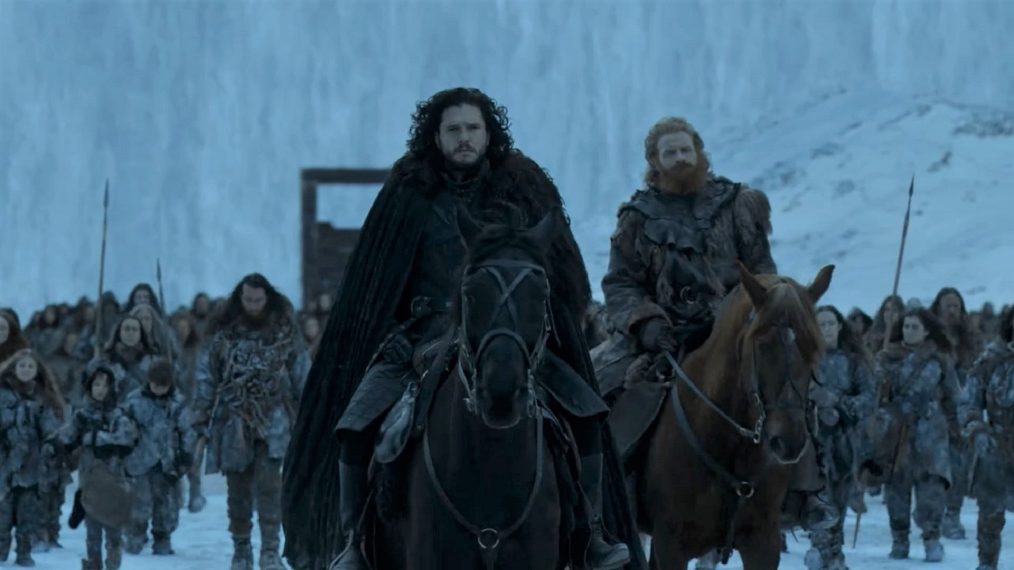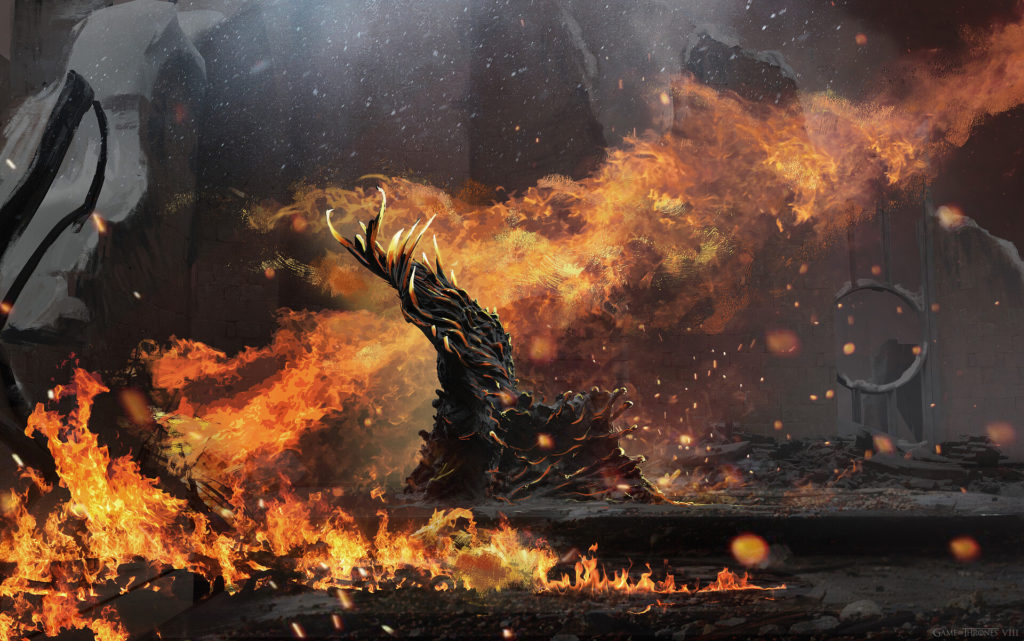
It’s been a fun ride, fellow Game of Thrones viewers. But all games must end, and most of them have a winner. It seems silly to warn that spoilers abound now that the show is over, yet spoilers abound below!
One of the things that made Game of Thrones such a popular show was its supposed realism. Most fantasy landscapes with dungeons and dragons copied Tolkien’s fantasy realm of Middle Earth, which was a functional cowboy western. Those worlds are populated with very clear white hat good guys and black hat bad guys. Thrones author George RR Martin made every effort to avoid that cliched fantasy landscape, and the show’s finale was a showcase of that effort. In Tolkien’s Lord of the Rings, the ending is so happy that Samwise Gamgee exclaims in disbelief, “Is everything sad going to come untrue?” Ramsay Bolton’s vicious taunt to Theon Greyjoy in season five of Thrones clarifies George Martin’s opposite intention: “If you think this has a happy ending, you haven’t been paying attention.”
So how did the story end? Happy is a strong word for a notoriously bleak show, but not an altogether wrong one. The four remaining Stark siblings make it out alive. Tyrion, Ser Davos, Ser Bron, and a host of other named characters last until the end. Given her mad queen antics in the penultimate episode, nobody expected Daenerys to survive. Bittersweet may be a better word than happy, but either way, our experience with the show’s intentional nihilism leads me to believe that the ending could have been much worse.
A few thoughts about three characters whose stories have notable endings in the season finale:
One happy ending was given to Jaime Lannister, though he died in the episode prior. There’s a book in the Red Keep that outlines a short biography of all the Kingsguard in the history of Westeros, one of those illuminated manuscript style books that are eight inches thick. It’s called The White Book, and because Ser Jaime Lannister was a member of the Kingsguard, he too had a page in the book summarizing his service thus far. Unlike the other knights listed in the book, Jaime’s biography was not one that most people would be proud of. “Served under Tommen I” says The White Book. Tommen was the supposed child of King Robert Baratheon, but was actually sired by Jaime in his incestuous love relationship with his Queen sister Cerci. The White Book also notes of Jaime: “Known as The Kingslayer,” a reference to Jaime’s oath-breaking assassination of the Mad King Aerys, the very king he was charged to protect. That’s about all we see in Jaime’s history in the book so far. It’s not very pretty.
As Jaime’s other lover, Ser Brienne of Tarth, opens the book, she finds his blank entry, and proceeds to fill in the gaps.
“Took Riverrun from the Tully rebels, without loss of life. Lured the Unsullied into attacking Casterly Rock, sacrificing his childhood home in service to a greater strategy. Outwitted the Targaryen forces to seize Highgarden. Fought at the Battle of the Goldroad bravely, narrowly escaping death by dragonfire. Pledged himself to the forces of men and rode north to join them at Winterfell, alone. Faced the Army of the Dead and defended the castle against impossible odds until the defeat of the Night King. Escaped imprisonment and rode south in an attempt to save the capital from destruction.”
It’s a summary of all Jaime’s triumphs and struggles, which also included his capture by the Stark Army in the Whispering Woods and his dismembered hand. But the best line Brienne writes is the last line: “Died protecting his Queen.”
Knowing that Jaime’s incestuous relationship with Cerci was a poorly kept secret, Brienne writes gracefully about Jaime’s life, giving him an epitaph of sorts that fits his character well, even if it’s not the whole story. The Bible word for this is “imputation,” a word meaning “to assign a quality to someone.” Brienne left a history of Jaime that highlights his triumphs, ignores his deep and real character flaws, and saves his honor in the history books. He will not be remembered solely as The Kingslayer who was also into incest, but as a man of deep ability and love for normal people. He will forever be held in high regard because of Brienne’s imputing work. A happy ending for a man whose life was defined by shame and deep inner conflict.

A second happy ending arrives for Bran Stark, now Bran the Broken, First of His Name, King of the Andals and the First Men. Heretofore known for his mystic ability to see the past and mind meld with animals, Bran was such a long shot at becoming king that he wasn’t considered in the running (a complaint that many regular watchers levied against the show’s final season). It’s an unorthodox choice for Westeros that the next person to sit on the now-destroyed Iron Throne can’t get up out of his own wheelchair.
Perhaps it is good that the Kingdom of Westeros has a broken king, one who is familiar with the malevolence of the world. Bran’s immobility is the direct result of Jaime Lannister pushing him out of a tower window in the first season. What makes Bran remarkable beyond his handicap is that his mystical role as The Three-Eyed Raven has given him enough perspective to know that his own personal suffering comes with a call to a higher purpose. Multiple characters come to Bran throughout the series and ask him for forgiveness, particularly Jaime and Theon, and his response to them is something like: “your actions led to this moment now.” Bran was insinuating that the trials of the past were formative in building the team that defeated the wicked Night King earlier in the season. He’s a unique character, one that seems set apart from the pettiness of the world and unmoved by feelings of anger, resentment, or greed. Despite my initial skepticism of his kingship, looking back, I’m less anxious about it now. He might have just the right mix of detachment and vision to be the king that rebuilds the continent.
One last ending of note, though not quite a happy one. Jon Snow’s heroism is met with a raw deal: he is exiled back north to resume his post at The Night’s Watch after saving the continent from an insane Daenerys. While the other characters are gifted with significantly happier endings – Sansa is the queen in the north, Arya gets to continue adventuring, Bron gets his castle, even Grey Worm finds a mission of fulfillment – Jon is given a punishment for the murder of Daenerys. To satisfy the (just) demands of Grey Worm, Yara Greyjoy, their allies, and to satisfy the (love) demands of the Starks and their allies, Jon accomplishes his most heroic act yet. He becomes the scapegoat, embodying the punishment of a lawbreaker by heading back to the place of atonement. Forget the fact that The Wildlings beyond the wall are at peace with Westeros, and ignore the defeat of the cursed white walkers. Jon bears the sins of all the leaders of Westeros, giving up his rightful claims to land, family, and titles to resume his watch on the wall. That’s the final sacrifice that allows for a unified six kingdoms, a free North, a satisfied army of Unsullied, and the election of Bran the Broken. A small consolation: he is reunited with his direwolf, Ghost. The show closes with Jon joining Tormund and the rest of The Wildlings as they return to the region beyond of the wall, suggesting perhaps that Jon is done with the people of Westeros and moving away to a place of peace. He doesn’t have to be king of anything anymore, his oft-repeated wish finding fulfillment in the last moments of the season.
Among the show’s most notable and meaningful conclusions, we find a hero scapegoat for the sins of the world, a broken king crushed by the malevolence of the human race, and an imputed identity that covers a multitude of sins. Certainly, these themes sound Christian, even though there’s not a Christian to speak of between Martin or the show’s directorial staff (Martin describes himself as a lapsed Catholic and a skeptic, the showruners Benioff and Weiss are Jewish). I wonder, perhaps, if the show’s commitment to realism set itself up to dig into the cruciform solution handbag. The “more real” GoT became, the more the show’s writers self-limited the solutions that were available to them. Unlike the deus ex machina eagles in Lord of the Rings, who provide an easy rescue off of Mount Doom for Frodo and Sam, there would be no eagles for Jon Snow and team. Real world violence and conflict needs real-life solutions, so what are we to make of the fact that all the answers given here are, well, cruciform in nature?

Let me summarize: in a world crafted by storytellers to mimic the realistic terrors of our own world, the only way you can have a happy ending for any character is to pull from the Christian imagery of salvation. Substitutionary sacrifice, imputation, scapegoats, and the power of weakness. That’s how The Great Game finds its solution. The story of Christianity, set in its own context of wicked rulers, bloody injustice, and absent karma, laid the only possible path forward for “a happy issue out of our affliction.” In a world as violent and apparently meaningless as our own, believable happy endings are sparse and rarely achieved without someone’s blood on the floor.
See also, this note from Slate regarding Bran’s “election” as the Three-Eyed Raven:
It’s this part of Bran’s story that makes him exceptional, not the way he bounced back from tragedy and soldiered determinedly on. He’s a literal chosen one, part Dalai Lama, part Doctor Manhattan. If you accept that idea, then what mattered in the Battle of Winterfell wasn’t that tens of thousands died or even that the tide of undead was stopped from washing across Westeros. What mattered was that Arya stayed the Night King’s hand just before he killed Bran. The show traded one form of preordained monarchy—Jon Stark deserves the throne because of who his parents were—for another.

But most poignant of all was the final interchange between Jon Snow and his lover/Aunt/Mad Queen (gah!) Daenerys Targaryen. Torn about whether he should support or assassinate the woman who burned a city to the ground with her dragon, his final decision comes when Daenerys commits to wrath instead of forgiveness. “You can’t hide behind small mercies,” she tells Jon as he begs for the lives of captured enemy soldiers. “The world we need is a world of mercy. It has to be,” says Jon, who soon embraces Daenerys lovingly and with tears before he ends her life. It was enough that the folks at RNS suggested the famously nihilistic show ended with Henri Nouwen instead of GRRM.
If anything, the conclusion of Game of Thrones speaks to the earthy reality of the Christian gospel, which offers a happy ending to a world where there is none other available. Or at least, it speaks to the sensibility of the Christian gospel, that it has emotionally satisfying solutions which make sense regarding the problems of the real world. Imputation, scapegoat, a broken king, and the world’s need for mercy- it’s not that we’ve heard this story before. But it’s certainly not the first time we’ve read that happy ending.

COMMENTS
One response to “Game Over: A Broken King, a Scapegoat, and an Imputed Legacy on Game of Thrones”
Leave a Reply













<3 <3